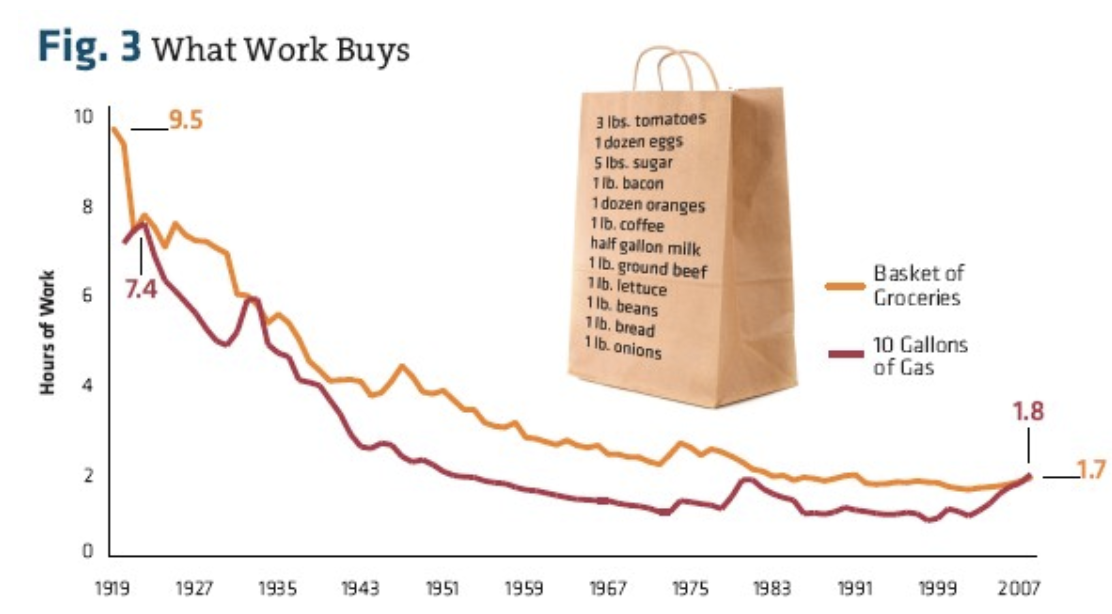A selected yet unlisted number of items that were more expensive 70 years ago. I'm sure bread and chicken used to cost way more before our food system became super industrialised. But obviously the quality of many of those items, the suffering of the animals, and the pollution have changed massively since then.
Nah, nowadays they load it up with corn syrup because why the fuck not
Chicken prices are throught the roof, Avian Flu inflation.
When a Tyson contractor's warehouse tests positive for that flu all the birds are destroyed. Tyson (and others in the industry) then gets to jack up the prices due to "supply issues".
One whole basket of $1 noodles (that are now $1.80 due to inflation and greed, and instead of 500g are 470g)
oh word.
now do rent and education. actually do medicine too.
Uh, I'd like to object. It costs my family a $100 bill just to darken the door of a Walmart.
I'd like to see a more detailed analysis of this, because this just rings false to me, the cost of living wasn't twice as high in the 50s as it is today. Only 1 in 3 women even worked in the 50s. Are they using the average wage, which gets skewed upward by inequality? What's in that basket of groceries? Are we comparing same-sized baskets of food? Do we go to the store at the same frequency? What about rent? We should be talking about income left over after paying for housing, not gross income.
*The meme has a source linked: https://www.aei.org/articles/how-are-we-doing/
That's a conservative think tank. https://en.wikipedia.org/wiki/American_Enterprise_Institute
**Here's their figure, but the source given is just "bureau of labor statistics," no link to a study
Show
***Can't find their source so I have to wing it. In 2024 the median US hourly wage—I assume they used the average—is $28.16 an hour (the median was around $23 in 2020).
That means, according to this AEI figure, a basket of groceries costs 1.8 * $28.16 ≈ $50.69I just realized their figure only goes up to fucking 2007. In 1950 the average US wage was $1.60 an hour (I can't find the median anywhere). $1.00 in 1950 is around $13.09 today, so $1.60 is around $20.94. If a bag of groceries was 4 hours of work, that's $6.40 in 1950 dollars and $83.76 in 2024 dollars.I have no idea if that's true because I can't find their source.
For housing, I'll do medians instead of averages. The median home value in 1950 was $7,354, and the median gross rent was around $42. In today's money, that's around $96,263.86 and $550, respectively. Compare that to the median 2024 home price of $400,000 and the median 2024 rent of $1,723. Median rent is more than 3 times as expensive today as it was in 1950, and the median home price is more than 4 times as expensive.
I'm too tired to do wage-minus-housing in 1950 and today. If anyone wants to pick it up, feel free.
I just realized their figure only goes up to fucking 2007.
I'm sure the fact that the graph stops 17 years ago, right before the biggest economic recession since the great depression, is just a coincidence.
What the hell is going on with those groceries. 3 pounds of tomatoes? 5 pounds of sugar? What, were people making their own ketchup and drinking a glass with every meal?
So these mythical people only ate tomto and ground beef sandwiches?
A single loaf of bread ain't doing three meals a day with a family of four.
5 pounds of sugar? Are... they talking about ants?
This family doesn't brush its teeth, this family doesn't wash with soap, this family doesn't wipe their ass, this family doesn't do laundry, this family doesn't clean their counter tops in the kitchen, this famly doesn't scrub their toilets, nobody in this family menstruates...
Anectodote time: Its just me and my spouse. With a really big garden, we're spending 80$ at the grocery store... sometimes... and that's WITH producing eggs, milk, kale/chard, apples, pears, tomatoes, blackberries, bell peppers and other stuff I can't think of right now, at home.
Yo, that’s wild, almost like it ignores i paid $80 for the most basic of groceries yesterday!
you don't make $50/hr? have you considered asking your father for a promotion at his apartment complex owning business?
The way this is phrased you could almost mistake this as talking about socially necessary labor time, not labor exchange value












